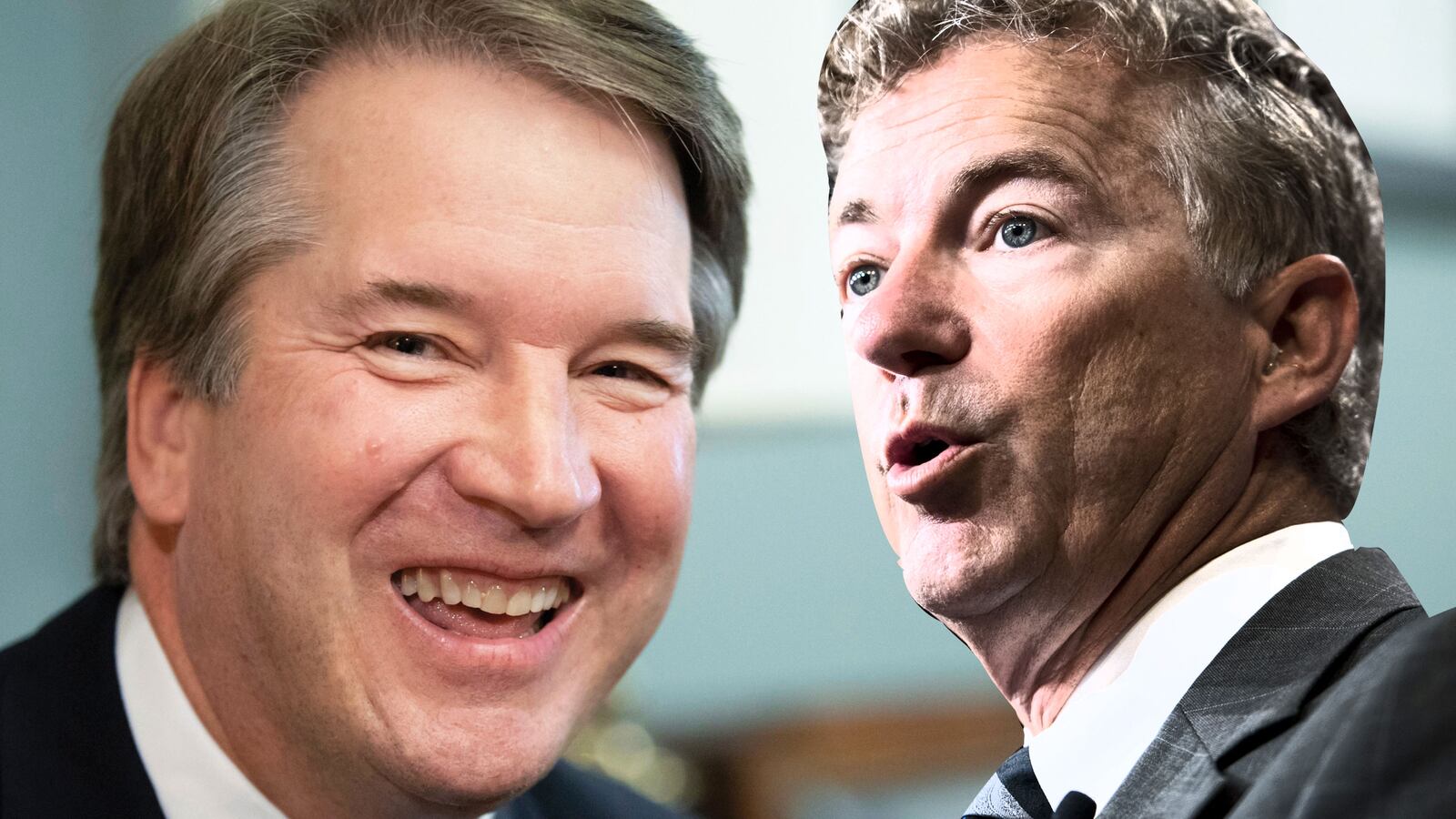Supreme Court nominations are steeped in tradition.
The pageantry of the announcement of the nominee, the escorted visits around Capitol Hill for meetings with senators, the confirmation hearing and, most of the time, the vote.
With Supreme Court confirmations now growing increasingly contentious, it may be time to add another tradition to the list: the pretend holdout.
It’s the senator who, for any reason, decides that he or she isn’t sure about a nominee that checks almost every box that his or her respective party wants to see in a Supreme Court justice; who prolongs the announcement of a position on confirmation, building sometimes artificial tension in the process.
This time, that senator is Kentucky Republican Rand Paul.
In an interview with Politico, Paul said he was “honestly undecided” on whether to vote for Brett Kavanaugh, President Donald Trump’s choice to fill the upcoming vacancy on the high court. Paul cited Kavanaugh’s views on the National Security Agency’s bulk collection of Americans’ data, a program the senator has long opposed.
“Kavanaugh’s position is basically that national security trumps privacy. And he said it very strongly and explicitly. And that worries me,” Paul said.
If all Democrats vote against Kavanaugh—and if Sen. John McCain (R-AZ) is unable to make it back to the Senate due to his ongoing cancer treatment—Paul’s potential “no” vote would sink Kavanaugh’s nomination. And it would put Paul on the receiving end of a presidential tweet-storm of epic proportions. He would bear the blame for costing his party, at least temporarily, a chance to reshape the Supreme Court for a generation.
And that’s why his colleagues, on both sides of the aisle, are under no illusion that the libertarian senator will end up voting against a qualified, experienced, conservative nominee like Kavanaugh.
“You guys get teased so easily,” Senate Minority Whip Dick Durbin (D-IL) said with a heavy laugh when asked if he thinks Paul could join most Democrats in opposing Kavanaugh.
“We don’t usually count on that,” Sen. Tim Kaine (D-VA) joked.
There are reasons to be skeptical of Paul’s holdout on Kavanaugh. Recently, he vowed to do everything in his power to block Mike Pompeo from becoming secretary of state, citing Pompeo’s positions on the Iraq war and regime change. In the end, Paul voted to confirm Pompeo.
More generally, Paul has been consistent in warning about government overreach on issues related to privacy, data collection, and the Fourth Amendment. But even those who admire his philosophical disposition on these fronts said they expect Paul to fall in line in the end.
“On privacy, Sen. Paul has been a very consistent, very active legislator on ensuring that Americans’ privacy is strongly protected. So this is not some new concern of his,” Sen. Chris Coons (D-DE) said in an interview. “Unfortunately, Sen. Paul has a history of making a big declaration about something that will change the outcome of an important vote, and then in the last days or hours before the vote, changing his position.”
Paul’s Republican colleagues, likewise, don’t seem to be nervous about his holdout. For that reason, they aren’t bothering to use valuable resources to sway him. Senate Majority Whip John Cornyn (R-TX), who is in charge of the GOP’s vote-counting operation, appeared unmoved by Paul’s apparent reservations about Kavanaugh.
“[Privacy rights] are obviously an area of particular concern of his, so he’s entitled to satisfy himself,” Cornyn told The Daily Beast.
Paul formally sat down with Kavanaugh on Tuesday, which an aide described as a “good meeting.” The senator’s office did not immediately respond to a request for comment for this article.
Like Senate Republican leaders, conservative outside groups such as Heritage Action and Americans for Prosperity aren’t planning on diverting any funds to court Paul’s vote.
Even so, Tim Chapman, the executive director of Heritage Action, said Paul’s exercise, as well as the efforts of perpetual fence-sitters like Sens. Susan Collins (R-ME) and Lisa Murkowski (R-AK), is important.
“All of these people have specific issues that they care a lot about as senators and they’ve staked a reputation on those issues, and so they want to make sure that people understand that they still do care about those issues,” Chapman said. “So for Rand Paul, it’s the Fourth Amendment issue. That is part of his brand and it’s one of the things his fiercest supporters like most about him.”
“He has to kind of go through the process of making sure that Judge Kavanaugh hears his perspective on it, I think,” Chapman added. “To me it’s a very rational process. If I were in the Senate I’d be doing the same thing on the issues that I care about, and I think that’s the important thing for the Senate to do.”
So why is Paul bothering to air his reservations at all? Ron Bonjean, a former Republican Senate leadership aide who helped usher then-Supreme Court nominee Neil Gorsuch through the confirmation process, said some of the GOP holdouts in the Gorsuch fight wanted to make a point to the White House.
“Several Republicans seemed as if they were on the fence last time because they wanted to make sure that the White House was not taking the ‘nuclear option’ for granted and that the Gorsuch team was doing all it could to get him confirmed,” he said, referring to Senate Majority Leader Mitch McConnell’s (R-KY) decision to change the rules in applying a 50-vote threshold for Supreme Court nominees. “That’s why we created the ‘no stone unturned’ campaign to showcase the effort being made to court Senate Democrat votes and how difficult it was to achieve.”






